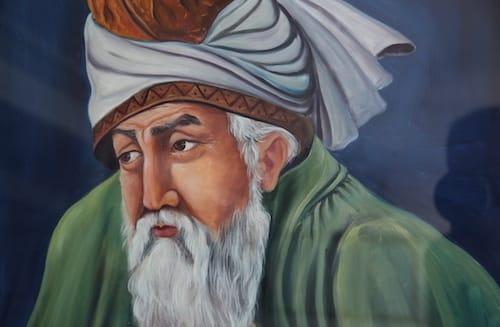Jalal al-Din Muḥammad Rumi is considered one of the great poets of the 13th century, a high-class Islamic scholar, Islamic teacher and master of mystics among the numerous other professions he held. He was born in Balkh, which falls within the present-day boundaries of Afghanistan’s Greater Khorasan region, and from that time onwards his deep spiritual insights expressed in poetic language fascinated readers up to our days. His works include the six-volume epic poem Masnavi, and Divan-e Shamsa“e Tabrizi, which is a collection of poems written in honor of his spiritual guide, Shams-e Tabrizi.
Early life
Rumi was born on September 30, 1207, in Balkh, a city that had been a major center of Persian culture and learning. His father Bahāʾ al-Dīn Walad was an Islamic scholar of great renown and also a mystic who belonged to the Sufi school while his mother was called Mahtab Khatun; She, among other things, is famed for her devotion.. He grew up delving into the rich intellectual and spiritual traditions of Islam in his childhood years.
Early Childhood Education
At the beginning young Rumi’s education was conducted mostly by his father who taught him Islamic law, philosophy, theology, and Sufism at that part of his life. The spiritual development and intellectual quest of Rumi was therefore greatly shaped by his father’s role.
The Mongol Invasion and Migration
Their family had to leave the country because of the Mongolian invasion in the 122s but somewhere towards Konya where Anatolia is located today they were spared of complete humiliation. This was a turning point in Rumi’s life since it was at this time he came into contact with new cultures and spiritual ways.
Encounter with Shams-e Tabrizi
Meeting Shams-e Tabrizi, a peripatetic sufi, was one of the main events in Rumi’s life. This man’s deep wisdom as well as his captivating personality left an impact on Rumi compelling him to turn towards spirituality completely. It is during the intense spiritual bond between the two that some of Rumi’s most beautiful and evocative poetry was written.
Spiritual Teachings and the Mevlevi Order
He taught about love being the main thing in human life, compassion or empathy for everyone including strangers beside our relatives and friends, divine unity’s significance which implies that all people are interconnected since they were made by one godhead who created everything on earth.
Literary Works
Rumi’s works are numerous and wide. He has the few most notable works such as:
Masnavi
This is a six-volume epic poem that explores various spiritual as well as philosophical themes.
Divan’e Shams’e Tabrizi
It is a collection of lyrical poems which express deep love longing for his spiritual guide Shams-e Tabrizi.
Fehi-Ma Fehi
This book presents discourses and aphorisms revealing deep truths about Sufism and spirituality alike.
Death and legacy
Rumi departed from this world on December 17, 1273 in Konya at the end of his life. But even though he died his poetry still lives on inspiring millions across the globe today. Through him the message of love has gone beyond any cultural or religious boundaries since it is universal for all humans combined together by compassion which stems from that single source.


Well I really enjoyed reading it. This article procured by you is very helpful for proper planning.